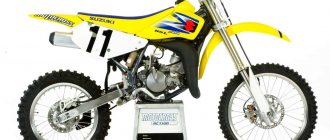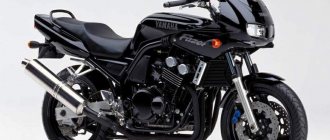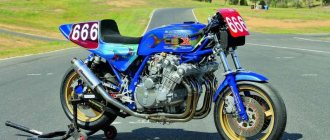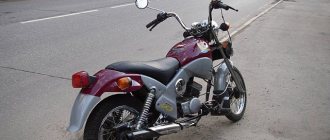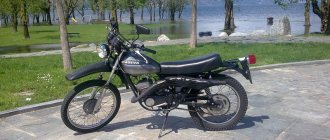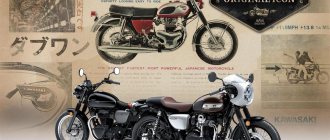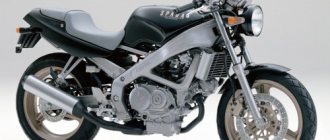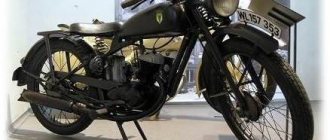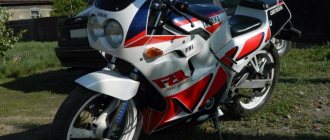| Suzuki GS500E (1989-2000) | Suzuki GS500 (2001-2011) | Suzuki GS500F (2004-2011) |
Model of the classic road motorcycle Suzuki GS500
appeared in 1989 as an export model, available in the main world markets - Europe, North America, Oceania. The GS model series itself has been known since 1976.
In 1989, the Suzuki GS 500 model debuted in the markets of Europe and North America. This year's models had low two-piece handlebars that visually resembled clip-ons and, coupled with a diagonal steel frame, gave the motorcycle a sporty look. By 1990, the handlebar height was increased.
In 1992, the Suzuki GS 500 model received changes to the front suspension - in particular, it became possible to adjust the preload.
The next small change was made in 1997. The model receives new front caliper pistons, which are now the same size (in previous versions they were different sizes). In 1998, French versions of the GS500 were equipped with new Mikuni BSR34 carburetors.
In 2001, the model undergoes a slight restyling, receiving a more modern appearance, a 20-liter fuel tank and Mikuni BSR34 carburetors in all markets.
Since 2004, the GS500 model series has been replenished with a new modification - Suzuki GS500F
. This is a sports tourer version with a plastic body kit and sporty GSX-R styling.
2011 was the last year of production of the model, after which it finally left the market. During the final years of production, the main market for the Suzuki GS500 was the South American market. The main reason for discontinuing the model was the tightening of environmental standards, which the old carburetor engine with an air cooling system did not comply with.
The main competitors of the Suzuki GS 500 in the class:
- Honda CB 500
- Honda CBF 500
- Kawasaki ER-5
Brief history of the model
- 1989 - start of production and sales.
Model
: Suzuki GS500(E) (Europe, North America).
Factory designation
: GS500EK.
- 1990 - the model receives an increased steering wheel height.
Model
: Suzuki GS500(E) (Europe, North America).
Factory designation
: GS500EL.
- 1991 - no significant changes.
Model
: Suzuki GS500(E) (Europe, North America).
Factory designation
: GS500EM.
- 1992 - The model receives a front fork with adjustable preload.
Model
: Suzuki GS500(E) (Europe, North America).
Factory designation
: GS500EN.
- 1993 - no significant changes.
Model
: Suzuki GS500(E) (Europe, North America).
Factory designation
: GS500EP.
- 1994 - no significant changes.
Model
: Suzuki GS500(E) (Europe, North America).
Factory designation
: GS500ER.
- 1995 - no significant changes.
Model
: Suzuki GS500(E) (Europe, North America).
Factory designation
: GS500ES.
- 1996 - no significant changes.
Model
: Suzuki GS500(E) (Europe, North America).
Factory designation
: GS500ET.
- 1997 - The front caliper is equipped with new pistons of the same size.
Model
: Suzuki GS500(E) (Europe).
Factory designation
: GS500EV.
- 1998 - French models receive new Mikuni BSR34 carburetors.
Model
: Suzuki GS500(E) (Europe).
Factory designation
: GS500EW.
- 1999 - no significant changes.
Model
: Suzuki GS500(E) (Europe).
Factory designation
: GS500EX.
- 2000 - no significant changes.
Model
: Suzuki GS500(E) (Europe).
Factory designation
: GS500EY.
- 2001 - restyling of the model. The model gets an updated appearance, a classic steering wheel, and a 20-liter fuel tank. and new Mikuni BSR34 carburetors in all markets. The letter "E" was removed from the name.
Model
: Suzuki GS500 (Europe).
Factory designation
: GS500K1.
- 2002 - no significant changes.
Model
: Suzuki GS500 (Europe).
Factory designation
: GS500K2.
- 2003 - no significant changes.
Model
: Suzuki GS500 (Europe, North America).
Factory designation
: GS500K3.
- 2004 - the appearance of a sports-touring modification of the Suzuki GS500F. The model is distinguished by a plastic body kit, a sports-style headlight and the presence of an oil cooler.
Model
: Suzuki GS500;
Suzuki GS500F (Europe, North America, Australia). Factory designation
: GS500K4; GS500FK4.
- 2005 - no significant changes.
Model
: Suzuki GS500;
Suzuki GS500F (Europe, North America, Australia). Factory designation
: GS500K5; GS500FK5.
- 2006 - no significant changes.
Model
: Suzuki GS500;
Suzuki GS500F (Europe, North America, Australia). Factory designation
: GS500K6; GS500FK6.
- 2007 - no significant changes.
Model
: Suzuki GS500;
Suzuki GS500F (Europe, North America, Australia). Factory designation
: GS500HK7; GS500FHK7.
- 2008 - no significant changes.
Model
: Suzuki GS500;
Suzuki GS500F (Europe, North America, Australia). Factory designation
: GS500HK8; GS500FHK8.
- 2009 - no significant changes.
Model
: Suzuki GS500;
Suzuki GS500F (South America, North America, Australia). Factory designation
: GS500HK9; GS500FHK9.
- 2010 - no significant changes.
Model
: Suzuki GS500;
Suzuki GS500F (South America, North America, Australia). Factory designation
: GS500HL0; GS500FHL0.
- 2011 - no significant changes.
Model
: Suzuki GS500;
Suzuki GS500F (South America, North America, Australia). Factory designation
: GS500HL1; GS500FHL1.
Advantages of a motorcycle
The Japanese motorcycle will most likely be called ancient and obsolete, but this is its primary advantage. Unlike most modern brothers, the bike has been run in and retested hundreds of times in the most difficult situations. The motorcycle engine deserves special praise. It is characterized by increased reliability and ease of repair. The characteristics of the Suzuki GS 500 engine are relatively modest, but this is compensated by the Japanese’s moderate appetite (fuel consumption per 100 km is slightly less than 5 liters) and throttle response (excellent torque at medium and low speeds).
Suzuki GS500 is equipped with a 22-liter gas tank , which is quite enough for a comfortable ride, both within the city and on the highway. Separately, it is worth mentioning the motorcycle suspension, as it has conflicting reviews among bikers. Motorcyclists accustomed to aggressive high-speed driving consider it too soft and generally unsatisfactory, while drivers inclined to moderate driving call it pleasant and comfortable. Indeed, the Suzuki GS500 is somewhat clumsy on steep turns that require “laying in”, but it is very confident on city roads with many defects.
One of the undoubted advantages of the Suzuki GS500 is the brake system of the motorcycle. The bike is equipped with two-piston brakes and a massive 310-mm disc at the front, which, coupled with a reliable rear disc brake, allows you to react with lightning speed to changing road conditions.
Due to the relatively modest dynamic characteristics, the components and parts of the Suzuki GS500 chassis are more durable. Similarly, the service life of tires increases - the need to replace them arises only after 20,000 kilometers.
Specifications
Technical characteristics of Suzuki GS500:
| Model | Suzuki GS500 |
| Motorcycle type | road (street, classic) |
| Year of issue | 1989-2011 |
| Frame | steel diagonal |
| engine's type | 2-cylinder, 4-stroke, in-line |
| Working volume | 487 cm³ |
| Bore/Stroke | 74.0 x 56.6 mm |
| Compression ratio | 9.0:1 |
| Cooling | air |
| Number of valves per cylinder | DOHC, 2 valves per cylinder |
| Fuel supply system | Carburetor, 2x Mikuni BST33SS – GS500E (1989-2000) Carburetor, 2x Mikuni BSR34 – GS500 (2001-2011), GS500F |
| Ignition type | transistor |
| Maximum power | 47.0 hp (35.0 kW) at 9200 rpm - GS500E (1989-2000) 51.3 hp (37.8 kW) at 9500 rpm – GS500 (2001-2011), GS500F |
| Maximum torque | 40.0 Nm (4.1 kg*m) at 7500 rpm – GS500E (1989-2000) 41.2 Nm (4.2 kg*m) at 7500 rpm – GS500 (2001-2011), GS500F |
| Clutch | Multi-disc in oil bath, cable drive |
| Transmission | 6-speed |
| type of drive | chain |
| Front tire size | 110/70-17 (54H) |
| Rear tire size | 130/70-17 (62H) |
| Front brakes | 1 disc, 310 mm, 2-piston caliper |
| Rear brakes | 1 disc, 250 mm, 2-piston caliper |
| Front suspension | 41 mm telescopic fork (preload adjustable, since 1992), travel - 120 mm |
| Rear suspension | pendulum with monoshock absorber (adjustable preload, 7-speed), stroke - 115 mm |
| Motorcycle length | 2075 mm – GS500E (1989-2000) 2080 mm – GS500 (2001-2011), GS500F |
| Motorcycle width | 725 mm – GS500E (1989-2000) 800 mm – GS500 (2001-2011), GS500F |
| Motorcycle height | 1045 mm – GS500E (1989-2000) 1060 mm – GS500 (2001-2011) 1150 mm – GS500F |
| Wheelbase | 1410 mm – GS500E (1989-2000) 1405 mm – GS500 (2001-2011), GS500F |
| Seat height | 790 mm |
| Minimum ground clearance (clearance) | 155 mm – GS500E (1989-2000) 150 mm – GS500 (2001-2011) 120 mm – GS500F |
| Acceleration 0-100 km/h (0-60 mph) | 6.05 sec[1] |
| Maximum speed | 159 km/h[2] |
| Gas tank capacity | 17.0 l (including reserve - 3.5 l) - GS500E (1989-2000) 15.0 L – GS500E (1989-2000) California version 20.0 l (including reserve – 4.3 l) – GS500 (2001-2011), GS500F 19.0 l (including reserve - 4.3 l) - GS500 (2001-2011), GS500F version for California |
| Motorcycle weight (dry) | 169 kg – GS500E (1989-2000) 174 kg – GS500 (2001-2011) 180 kg – GS500F |
Peculiarities
The bike has only two key features.
- Low steering wheel, divided into 2 parts in the style of clip-ons. The tilt of the handles towards the pilot also gave them a similarity. Users reacted sharply negatively to this idea and already in 1990 the developers removed this feature. The steering wheel became higher, the separation disappeared, and the bend became standard for road users.
Thanks to the narrow steering wheel width, the GS500E makes it easier to squeeze between cars in traffic jams.
- A well-balanced engine that allows the motorcycle to ride at minimum speed and not try to lean on neighbors on the road.
Users noted good handling and maneuverability.
Reviews
Reviews about Suzuki GS 500:
Expand Collapse
I've owned this motorcycle for just over two months, during which I've covered almost 5,000 km. From the very beginning, the only inconvenience I felt was the incomprehensible steering wheel - too narrow and also with handles bent back, it seemed impossible to hold my hands on it without the risk of spraining my wrist. Subsequently, I got used to this grip and now I don’t feel any discomfort. Among other inconveniences, I can note the rather high footrests and low saddle of the Suzuki GS 500. But these are hardly design flaws - they seem inconvenient to me rather due to my 192 cm height.
I like the good handling of the Suzuki GS at any speed and mode; it corners perfectly without any effort on the part of the rider. The steering wheel doesn't pull out even on rough roads, so the only work for your hands is to squeeze the clutch and unscrew the throttle.
Separately, it is worth mentioning the sound of the GS 500. The stock muffler at idle gives a quiet but serious sound. As turnover increases, it gradually loses its efficiency. However, after 6000, a very rich roar erupts from the muffler, similar to as if an iron propeller is hitting a thick cast-iron shield. I heard the same sound when the guys from Top Gear tested the Aston Martin Vanquish.
The sound is rich and loud, you turn up the gas in neutral and hear THIS, you feel that there is POWER under you. It was scary to get under way - I was afraid that I would either throw the clutch or spin the gas out of fright. I do everything very slowly and smoothly and move off carefully.
“Wow, this is a tank, it goes like it’s on rails, and I can’t even imagine how to turn such a thing.”
The steering wheel is narrow, the bike is heavy, I felt like a cow on ice when turning; I turned almost at idle, putting my foot out and trying not to tilt the engine
Yes, the landing is more inclined than on the south. Approximately the same as on the Hyosung GT 250, but about a quarter less inclined and the footpegs are a little lower.
There is no glove compartment. There is a small space under the seat, but such that you can only put gloves there. There is a button for flashing the high beams and turning off the engine.
In general, the first trips were very chaotic: a lot of emotions and adrenaline, and then you’re trying to remember something like the revs, gears, what the speed was...
And plus the mirrors there are not very good - they vibrate at speed and you can’t see anything. You practically drive without them, you have to look around. Which also added confusion and extreme.
And yesterday, after registering the sale, when I was driving home, in a traffic jam on the bridge I discovered an awesome feature - it DRIVES AT IDLE, you don’t even have to hold on to the gas!!!
Well, today when I was driving to work it was a little easier. I was already driving between the rows almost calmly.
Today I decided to pay attention to overclocking. I start from a traffic light (and I’m still afraid to turn up the gas sharply and too much), click two, click three - a hundred “wow, already?”
Well, in general, the motorcycle handles well, accelerates quickly, and goes straight. I'm happy.
I had one like this, dockless, so I sold it. The front fork is a bit soft, and there are a lot of gears - as many as six!!! Sometimes you forget which one you are on, I think five would be enough. And so the mot is good.
Years of manufacture and features
The model existed on the assembly line for more than 20 years. The main reason for the closure is the introduction of EURO 5.
Externally, the Suzuki GS 500 looks like a Spartan - frame, wheels, engine and no unnecessary plastic.
The carburetor engine of the bike did not meet the new standards , and considering that the motorcycle had been in production for quite a long time, they decided not to update it. In 2009, a gradual winding down of production began and the model was finally removed in 2011.
For 20 years, the motorcycle's hardware has remained virtually unchanged. There were several cosmetic updates , changes to external characteristics that did not affect driving performance. In 2001, it was planned to replace the carburetor with an injector, but it was never carried out. The old-style carburetor was replaced with an identical, but more “fashionable” model, and they calmed down.
Disadvantages of a motorcycle
Of course, the Suzuki GS500 racer, spoiled by ultra-technological high-speed technology, will frankly not be impressed. If the task is to purchase a motorcycle for reckless driving, then it is worth looking for another option, since the Japanese have a moderate and self-possessed character. However, there are more obvious shortcomings of the Suzuki GS500, which are difficult to write off as a feature:
- questionable quality of paintwork;
- low quality of frame welding with high wear resistance of the engine and gearbox;
- the assembly of the motorcycle leaves much to be desired;
- The design of the bike is outdated.
Price of Suzuki GS 500E according to sales advertisements
The maximum price of Suzuki GS 500E among the advertisements found is RUB 169,000*
The average price of Suzuki GS 500E among the ads found is RUB 83,000*
The minimum price of Suzuki GS 500E among the advertisements found is RUB 25,000*
Suzuki gs 500e in Kursk
11/23/2020 80,000 rub.
Suzuki GS500e in Vsevolozhsk
11/10/2020 85,000 rub.
Suzuki GS500E in Penza
06.11.2020 100,000 rub.
Suzuki GS500E 1996 in St. Petersburg
04.11.2020 79,000 rub.
Suzuki GS500e in Neman
10.27.2020 68,000 rub.
Suzuki GS 500E in Lipetsk
10/19/2020 70,000 rub.
Suzuki gs500e in Armavir
09.22.2020 35,000 rub.
Suzuki gs 500e in Kursk
08/31/2020 105,000 rub.
Suzuki GS500e motorcycle in St. Petersburg
10/18/2019 89,000 rub.
Suzuki gs500e 96 in Arkhangelsk
09.22.2019 60,000 rub.
Suzuki gs 500e in Valdai
09/16/2019 65,000 rub.
Suzuki GS 500E in Kushchevskaya
09.12.2019 110,000 rub.
Suzuki gs500E in Kolomna
09/10/2019 RUB 99,999
Suzuki GS 500E in Kaliningrad
08/25/2019 60,000 rub.
Suzuki gs 500e in Kursk
07/15/2019 135,000 rub.
Suzuki gs 500e 1991 in Chusovoy
07/02/2019 45,000 rub.
Suzuki gs500e for spare parts in Moscow
06/19/2019 25,000 rub.
Suzuki GS500E in Ivanovo
06/16/2019 130,000 rub.
Suzuki GS500E in Moscow
12/06/2017 70,000 rub.
Selling suzuki gs 500e in Shakhty
11/23/2017 55,000 rub.
Suzuki GS500E in Lgov
11/13/2017 50,000 rub.
Suzuki GS 500E in Orel
03/12/2017 100,000 rub.
Motorcycle suzuki gs500e, 1995 for sale in Domodedovo
03/11/2017 110,000 rub.
Suzuki GS500E in Lipetsk
03/10/2017 95,000 rub.
Suzuki GS500E in Stupino
02/08/2017 55,000 rub.
Suzuki GS500E in Lipetsk
02/08/2017 95,000 rub.
Suzuki GS500E in Vyazma
02/04/2017 80,000 rub.
Suzuki gs500e in Kyshtym
02/01/2017 53,000 rub.
Selling Suzuki GS500E in Primorsk
01/16/2017 70,000 rub.
Suzuki GS500E in Vyazma
01/13/2017 80,000 rub.
Selling my favorite Suzuki GS 500e in Penza
01/04/2017 85,000 rub.
Suzuki GS500E in Perm
11/14/2016 150,000 rub.
Suzuki GS 500E (2006) in St. Petersburg
11/13/2016 169,000 rub.
Suzuki gs500e in Valdai
10.26.2016 85,000 rub.
Suzuki GS500E in Voronezh
08/23/2014 68,000 rub.
Suzuki GS500E in Voronezh
08/23/2014 68,000 rub.
Suzuki gs500e in Kaliningrad
08/21/2014 75,000 rub.
Selling or exchanging Suzuki GS500E in Apsheronsk
08/20/2014 Not specified
Selling Suzuki GS500E in Belorechensk
08/20/2014 Not specified
Suzuki GS500E in Shakhty
08/12/2014 80,000 rub.
Gs 500e in Ulyanovsk
08/10/2014 110,000 rub.
Suzuki GS 500E in Podporozhye
08/06/2014 98,000 rub.
Suzuki GS500E in Velikiye Luki
08/04/2014 75,000 rub.
Suzuki gs 500e in Baltiysk
08/04/2014 55,000 rub.
Suzuki GS500E motorcycle in Sochi
07/22/2014 120,000 rub.
Suzuki GS500e 1998 in Sochi
07/16/2014 125,000 rub.
Suzuki GS 500e in Kaliningrad
07/01/2014 58,000 rub.
* Attention! Under the maximum, average and minimum of the Suzuki GS 500E motorcycle on this page, the average cost according to advertisements for sale on the Internet is indicated, without taking into account the year of manufacture, configuration and generation of the motorcycle model.
Owners' opinions
What do those who have driven the Suzuki GS500F say? Reviews often say that although the engine is reliable, it’s time for the manufacturer to think about progress. Still, a quarter of a century has passed since its creation. Not everyone is satisfied with a motorcycle suspension that is too soft, which quickly deteriorates and constantly needs maintenance. The quality of assembly and painting raises questions. Shortly after purchase, the modest layer begins to crack and chip, and the paint simply flies off. this entails the appearance of rust on any scratch. Other exposed metal parts are also susceptible to corrosion. Another weak point is the quality of welding seams. By and large, for the one who bought this model, there is a lot of work ahead.
But the fuel system is beyond any praise. it is reliable and economical; on one full tank you can travel almost half a thousand kilometers, which cannot but please fans of long roads.
Java 360 motor suzuki gs 500
I’ll post here too about the process of plugging the engine into Java. I’ve already posted on some forums. I’d like to hear opinions and suggestions
so to speak, one head is good and two are mutants ..
Then the idea came to make a reverse gear in place of the first gear. Well, the gs engine has 6 gears and it accelerates to 200. But I don’t need such speeds.. I would stupidly have 110-120 with a sidecar so that I could drive confidently.. Well, after I’ve assembled everything and run it in We need to implement this idea. There are still a couple of spare checkpoints anyway.
Guys, I think I missed a bit with the engine.. I should have taken another one for JAWA, it’s a bit too big
The tank won't sit down a little because it rests against the head cover.. Well, that's not a big deal. There's a couple of centimes there.. You can cut the tank and make it fit. Well, or remake the tank mount slightly..
Well, I really don’t want to remake the pendulum, since I’m doing it under the stroller. I’ll install ammo springs and front forks under the stroller.
Since the pendulum is short, there should be enough rigidity...
But you’ll have to look for a hydraulic steering damper somewhere at an engine disassembly site... I’m afraid that with a stroller and on such a frame, when you let off the gas (turn off the engine) you can catch a breakdown
Yes, I was very surprised.. I set the footrests in sizes like 360 Since it is the most comfortable for me. Yes, and I got used to it. I took measurements from my old lady and began to set them on the new frame.. What’s surprising is that the Java frames do not match by a couple of centimeters Apparently different years, or a joint
Yes, on Jupiter this motor doesn’t stand out much
Yes, I roughly trimmed the casings (or whatever they are called... decorative shields) Yes, there is little space left for the air...
Yes, and these ugly carbs... damn, they ruin the whole look... it's a pity I'm not an artist..
This is why I'm doing this in a nutshell
Well, yes, I’ve been wearing this model since I was 14 years old. I’m already 34.. so I’m definitely in love
Why a stroller? Well, it’s because of her that I install such a motor. Of course, I don’t touch my favorite. I’ll leave it in the original.. A single engine is enough for a completely native one. But with a sidecar at a cruise speed of 110, it’s very difficult for it. It takes a long time to pick it up with a tailgust of wind, and it drops this speed. But you can’t overtake a truck at all.. And go on long-distance trips with a stroller is one satisfaction for me.. Now think for yourself. You’re driving with people (in company) and keep the same speed. Well, that’s about 110 km. It’s like an oncoming truck.. and it slows you down up to 85 km (Very inconvenient
Yes, and the YA engine is already old. Previously, it was 300 versts to the Baltics And I was sure. But now, 50 km away, you can’t even take a shit again (what if something happens? And the spare parts they sell for them are so crooked that they have to be modified with a file..
So I decided to put together such a hodgepodge.. I just happened to have an expensive gs 500, not towed (double bass) with a dead engine, I removed everything from it (carbs, brains and so on) well, and in small things I got half the price of the motorcycle back by selling pieces of plastic Glushak battery and all this at 3800. Then I brought the motor from the engine dismantling shop. It’s in perfect condition. Compression is normal.. valve clearances are tight.. Transparent oil in the sump is clean.
Well, I think it’s stupid without a receiver (a resonator. Or it can also be called an intake muffler). So, two pipes from the carbs will pass through the casings and there they will come together into one body and there will be a foam stocking there.. Well, like on many enduros
or nulevik But also under covers ..
Or I’ll even make the filter frame myself by filling the free space and cover it with foam rubber..

